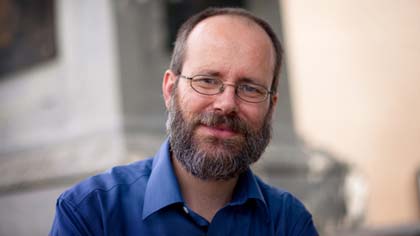Wolf T. Pecher
associate professor
Division of Science, Information Arts and Technologies
Additional Roles:
director, B.A. in Environmental Sustainability program
Contact Information:
Phone: 410.837.6720
E-mail: wpecher@ubalt.edu
Ph.D., University of Maryland, College Park
B.S. ("Vordiplom"), M.S. ("Diplom"), Christian Albrechts University (Kiel, Germany)
One day when I was in high school, I borrowed a book from the library on pathogens and infectious diseases. This book ultimately changed my life: Unknown to me then, its content was indeed highly "infectious" and—just as a very successful virus would do—planted a seed that years later developed into an obsession for pathogens and parasites.
I went on to Kiel, Germany, with the naïve intention to study marine biology. Not being able to enroll in the mandatory introductory courses to marine biology during my first year as a master's student, I decided to take a course in protozoan parasites instead. The "bug" planted in high school revealed its true identity: Very quickly I realized that parasites truly were my world, and I wanted to study and understand their lives. From Kiel, I moved to Baltimore to pursue a Ph.D. in marine estuarine environmental sciences. It's not surprising that with parasitic diseases in my mind, I joined the laboratory of Dr. Vasta at the University of Maryland Biotechnology Institute to work on host-pathogen interactions of aquatic animals. After completing my Ph.D., I continued to work at UMBI as a post-doctoral research associate in the laboratory of Dr. Jagus, focusing on the characterization of proteins that are involved in the immune response to viral infections in fishes and other vertebrates.
Beside having a passion for research and science, I also discovered a passion to communicate science. Maybe the "bug" in me just wants to be "spread." I feel therefore very fortunate and privileged to have become a member of the UBalt community at these exciting times of expansion and change. Being charged with the mandate to provide our students with Knowledge That Works, I see it as my job indeed to spread my "bug," and I hope that—together with the other science faculty—we will continue not just to teach science but to introduce our students to the beauty and wonders of our fragile world (and yes—of course!—that includes the fascinating world of "bugs," pathogens and parasites), just like that one small book from the library did for me.

